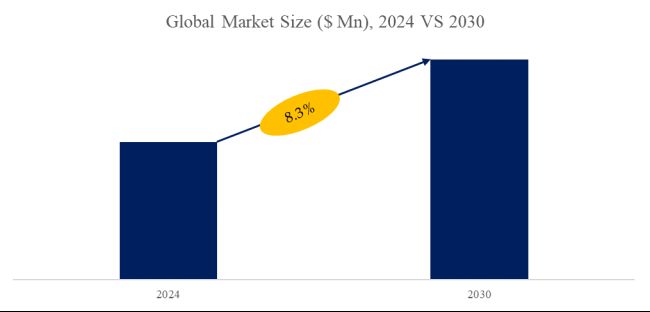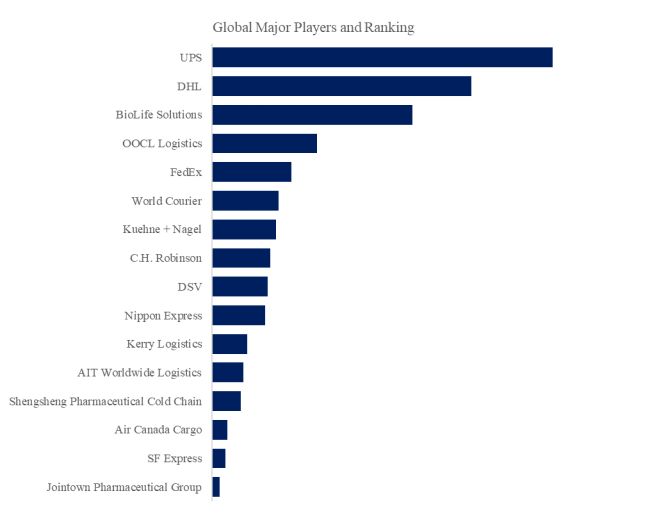Pharmaceutical Cold Chain Logistics Service Industry Analysis:the global market size is projected to reach USD 41.75 billion by 2030
Pharmaceutical cold chain logistics services are specialized services that ensure the safe and efficient transportation of temperature-sensitive pharmaceutical products. These services are essential for maintaining the integrity and efficacy of pharmaceutical products, as temperature fluctuations can compromise their quality and effectiveness. Pharmaceutical cold chain logistics services typically involve the use of temperature-controlled storage facilities, refrigerated vehicles, and specialized packaging materials to maintain the required temperature range throughout the transportation process. This ensures that pharmaceutical products remain within the specified temperature range from the time they are manufactured to the time they reach the end user. Overall, pharmaceutical cold chain logistics services play a crucial role in ensuring the safety and efficacy of pharmaceutical products. By maintaining the required temperature range throughout the transportation process, these services help to protect the quality of pharmaceutical products and ensure that patients receive safe and effective medications.
The pharmaceutical cold chain logistics services market is experiencing robust growth, driven by the increasing demand for temperature-sensitive drugs and biologics, as well as advancements in logistics technologies. Here are the key trends shaping this market:
- Rising Demand for Biopharmaceuticals
The growth of biopharmaceuticals and personalized medicine has increased the need for reliable cold chain logistics. These products often require strict temperature control to maintain efficacy, driving demand for specialized logistics services.
- Regulatory Compliance and Standards
Stringent regulations from health authorities (like the FDA and EMA) regarding the transportation and storage of temperature-sensitive pharmaceuticals are pushing companies to invest in compliant cold chain logistics solutions. Adhering to Good Distribution Practices (GDP) is crucial for market players.
- Technological Advancements
Innovations in cold chain technologies, including real-time temperature monitoring, IoT devices, and automated tracking systems, are enhancing visibility and control over the logistics process. These technologies help ensure compliance and improve efficiency.
- Increasing Globalization of Supply Chains
As pharmaceutical companies expand their global reach, the complexity of supply chains increases. Cold chain logistics providers are adapting to manage cross-border shipments and comply with varying regulatory requirements in different regions.
According to the new market research report “Pharmaceutical Cold Chain Logistics Service- Global Market Share and Ranking, Overall Sales and Demand Forecast 2024-2030”, published by QYResearch, the global Pharmaceutical Cold Chain Logistics Service market size is projected to reach USD 41.75 billion by 2030, at a CAGR of 8.3% during the forecast period.
- Global Pharmaceutical Cold Chain Logistics Service MarketSize(US$ Million), 2019-2030

Source: QYResearch, "Pharmaceutical Cold Chain Logistics Service- Global Market Share and Ranking, Overall Sales and Demand Forecast 2024-2030”
- Global Pharmaceutical Cold Chain Logistics Service Top16Players Ranking and Market Share (Ranking is based on the revenue of 2023, continually updated)

Source: QYResearch, "Pharmaceutical Cold Chain Logistics Service- Global Market Share and Ranking, Overall Sales and Demand Forecast 2024-2030”
According to QYResearch Top Players Research Center, the global key manufacturers of Pharmaceutical Cold Chain Logistics Service include UPS, DHL, BioLife Solutions, OOCL Logistics, FedEx, etc. In 2023, the global top four players had a share approximately 13.0% in terms of revenue.
Market Drivers:
Increasing demand for temperature-sensitive pharmaceutical products: The growing demand for biologics, vaccines, and other temperature-sensitive pharmaceutical products is driving the need for cold chain services to ensure the safe and effective transportation and storage of these products.
Stringent regulatory requirements: Regulatory bodies such as the FDA and EMA have strict guidelines for the transportation and storage of pharmaceutical products, especially those that are temperature-sensitive. This has led to an increased demand for cold chain services that can ensure compliance with these regulations.
Globalization of the pharmaceutical industry: The pharmaceutical industry is becoming increasingly globalized, with companies expanding their operations to new markets around the world. This has created a need for cold chain services that can provide reliable and efficient transportation of pharmaceutical products across borders.
Technological advancements: Advances in cold chain technology, such as temperature monitoring devices, GPS tracking systems, and data loggers, have made it easier to monitor and maintain the integrity of pharmaceutical products during transportation and storage. This has increased the demand for cold chain services that can leverage these technologies to ensure product safety and efficacy.
Market Challenges:
Technical challenges: Pharmaceutical cold logistics chain services need to ensure that medicines are always within a specified temperature range during transportation and storage. This requires cold chain service providers to have high-precision temperature control technology and equipment, such as refrigerated trucks, cold storage, temperature recorders, etc. However, different medicines have different temperature requirements, and some of them even need to be stored at extremely low temperatures, which puts higher demands on temperature control technology. At the same time, drugs need to be monitored throughout the cold chain transportation process to ensure that the quality of drugs is not affected. However, the monitoring technology of some cold chain logistics service providers in the market is not perfect enough, and there are monitoring blind zones or data errors, which leads to an increase in the risk of drug quality.
Cost challenges: Pharmaceutical cold logistics chain services require a large amount of infrastructure investment, including refrigerated trucks, cold storage and temperature control equipment. The acquisition, maintenance and upgrading of such equipment require substantial financial support, increasing the operating costs of cold chain services. Moreover, compared with room temperature logistics, pharmaceutical cold chain logistics services require higher professionalism and work intensity of personnel. Therefore, cold chain service providers need to invest more labor costs for staff training and management.
Diversified customer needs: There are differences in the needs of different customers for pharmaceutical cold chain services, such as the type of drugs, transportation distance, and time requirements. This requires cold chain logistics service providers to have diversified service capabilities to meet the needs of different customers.
About The Authors
Zhang Xiong - Lead Author
Email: zhangxiongg@qyresearch.com
Zhang Xiong is a technology & market senior analyst specializing in electronics and semiconductor, home appliances, Zhang has 8 years’ experience in electronics and semiconductor and focuses semiconductor materials (lead frame, EUV Photoresists, CMP Consumables, etc.), ICs, sensors/MEMS, RF, package & testing, etc. Typical studies include home appliances (coffee machines, refrigerators, washing machines, air conditioners, etc.) He is engaged in the development of technology and market reports and is also involved in custom projects.
About QYResearch
QYResearch founded in California, USA in 2007.It is a leading global market research and consulting company. With over 17 years’ experience and professional research team in various cities over the world QY Research focuses on management consulting, database and seminar services, IPO consulting (data is widely cited in prospectuses, annual reports and presentations), industry chain research and customized research to help our clients in providing non-linear revenue model and make them successful. We are globally recognized for our expansive portfolio of services, good corporate citizenship, and our strong commitment to sustainability. Up to now, we have cooperated with more than 60,000 clients across five continents. Let’s work closely with you and build a bold and better future.
QYResearch is a world-renowned large-scale consulting company. The industry covers various high-tech industry chain market segments, spanning the semiconductor industry chain (semiconductor equipment and parts, semiconductor materials, ICs, Foundry, packaging and testing, discrete devices, sensors, optoelectronic devices), photovoltaic industry chain (equipment, cells, modules, auxiliary material brackets, inverters, power station terminals), new energy automobile industry chain (batteries and materials, auto parts, batteries, motors, electronic control, automotive semiconductors, etc.), communication industry chain (communication system equipment, terminal equipment, electronic components, RF front-end, optical modules, 4G/5G/6G, broadband, IoT, digital economy, AI), advanced materials industry Chain (metal materials, polymer materials, ceramic materials, nano materials, etc.), machinery manufacturing industry chain (CNC machine tools, construction machinery, electrical machinery, 3C automation, industrial robots, lasers, industrial control, drones), food, beverages and pharmaceuticals, medical equipment, agriculture, etc.
Contact Us:
If you have any queries regarding this report or if you would like further information, please contact us:
QY Research Inc.
Add: 17890 Castleton Street Suite 369 City of Industry CA 91748 United States
E-mail: global@qyresearch.com
Tel: 001-626-842-1666(US) 0086-133 1872 9947(CN)
EN: https://www.qyresearch.com
JP: https://www.qyresearch.co.jp

English
Simon Lee

English
Hitesh

Chinese
Damon

Japanese
Tang Xin

Korean
Sung-Bin Yoon
Competition
Key players, new entrants,acquisitions, mergers and expansions,development trends and challenges.
Industry Analysis
Rawmaterial, application, product type, demand,supply,downstream, supply chain etc.
Market Size
Capacity, production, sales, revenue, price, cost etc.
Customized Information
We can offer customized survey and information to meet ourclient's need.